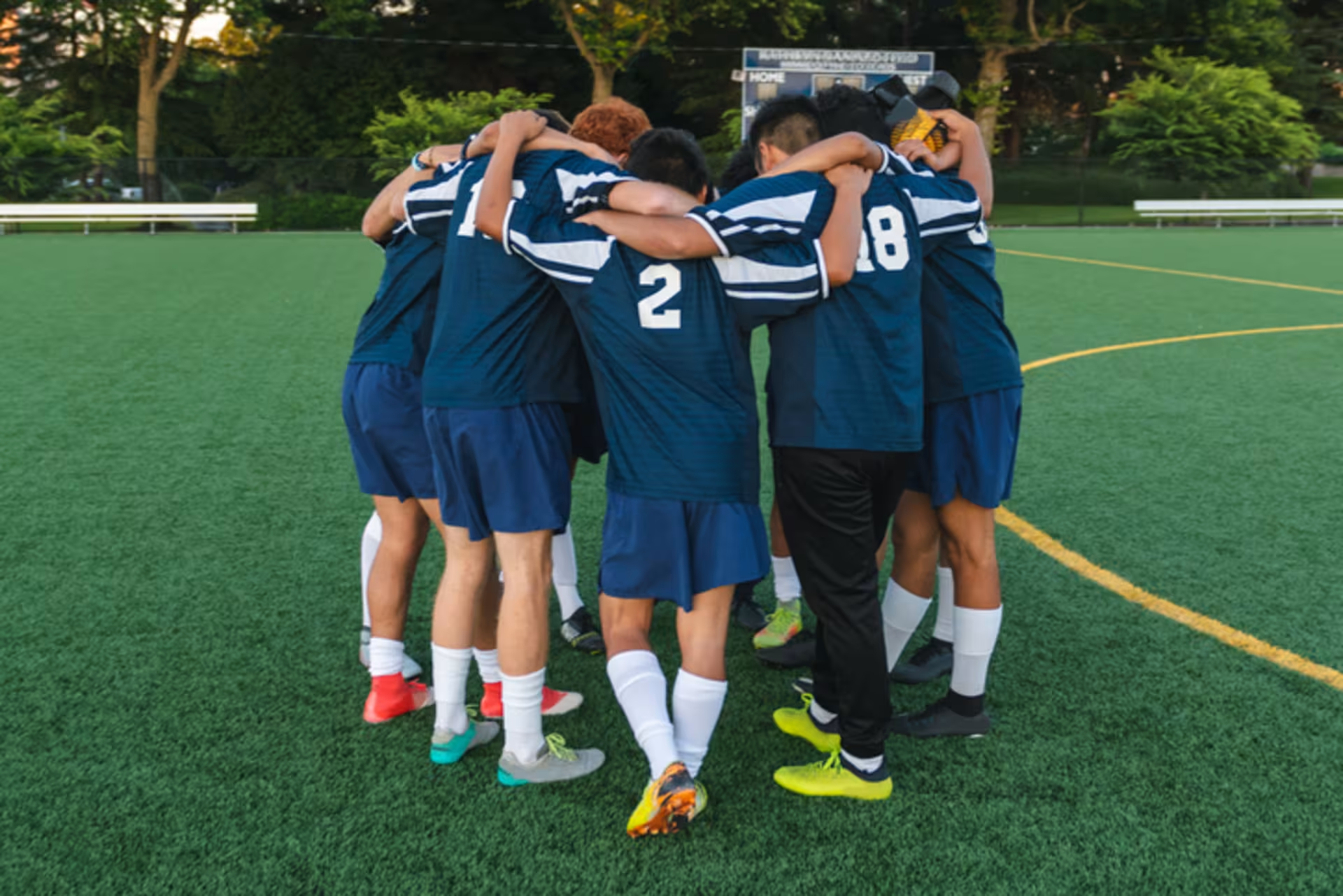Read time 6 minutes
Published on Jul 26, 2023
College sports are lots of fun to watch, both for the fans in the stands and those watching from their living room. For some fans, the amateurism aspect of college sports heightens the excitement, and for others, it’s the prospect of seeing young talent develop to the point at which a professional career becomes a real possibility. Yet, unlike professional athletes, college athletes do not receive salaries for their efforts.
This begs the question: Should college athletes be paid? Here, you can take a closer look at some of the arguments addressing the questions, “Why should college athletes be paid?” and “Why should college athletes not be paid?”
How Much Do College Athletes Get Paid?
As of May 2023, college athletes in the U.S. do not have the ability to demand a salary from their schools. This rule was established by the National Collegiate Athletic Association (NCAA), which has governed intercollegiate sports since 1906. One of the goals of the NCAA was to preserve the spirit of amateurism in collegiate sports.(See disclaimer 1)
In the spirit of amateurism, direct compensation to athletes was banned. It was thought that fans wouldn’t be as interested in watching college sports if the teams were comprised of professional athletes. It was also believed that if college athletes only received scholarships as a form of compensation, they would remain active members of the college community.
The NCAA had also prohibited collegiate athletes from receiving any compensation from their name, image or likeness (NIL). In other words, unlike professional athletes, college players could not endorse any products for money or sell autographs. In short, not only were college athletes prohibited from receiving direct compensation for their work, they also could not profit from their popularity. Athletes were also, for the most part, barred from signing with a sports agent for representation.
In June 2021, the rules changed somewhat. College athletes are still barred from receiving a salary (known as “pay for play”). However, the U.S. Supreme Court ruled that these athletes could indeed enter into NIL deals, whereby they could endorse products or sell their autographs. In its opinion, the Supreme Court noted that the idea of amateurism does not automatically lend itself to immunity from antitrust laws, and that prohibiting NIL contracts could indeed violate those laws.
Understanding the Athlete Compensation Argument
Should College Athletes Be Paid?
Although college athletes are now allowed to profit from NIL contracts, they still cannot receive pay-to-play salaries from their schools. The answer to the question, “How much do college athletes get paid?” can vary quite a bit, depending on their NIL deals, if available.
While some NIL contracts may involve significant sums of money, other NIL deals are quite small, perhaps only involving free merchandise from the endorsed brand. Furthermore, not all college athletes are popular or well-known enough to land an NIL deal with a brand. The question remains: Should college athletes be paid salaries?
Why Should College Athletes Not Be Paid?
There are arguments to be made for and against paying college athletes. So, why should college athletes not be paid? First, consider the non-monetary benefits of being a college athlete.
College athletes get the opportunity to compete at a high level (albeit not a professional level). They benefit from the enjoyment of their chosen sport and from coaching that can generally be considered a higher caliber than the high school level. In addition, collegiate athletes get the opportunity to build character, sportsmanship, teamwork and other soft skills that are prized by future employers.
It could also be argued that paying athletes in college could detract from the primary purpose of college: to provide an education. College athletes who get paid to play might pay less attention to their academic obligations, putting more of an emphasis on the work that they’re paid to do.
Next, consider the monetary benefits of being a college athlete (NIL contracts aside). Many college athletes receive sports scholarships, which are meant to be a form of compensation for their work. Some can even receive full-ride or full-tuition scholarships. Plus, if college athletes receive salaries on top of scholarships, it’s possible that less wealthy schools are at a higher risk of losing out on recruiting top talent, which can contribute to a less competitive intercollegiate environment.
Why Should College Athletes Be Paid?
There are plenty of arguments to be made for why college athletes should not be paid. Next, take a look at the arguments in favor of paying college athletes for their work — with the emphasis on the word “work.” Collegiate sports do indeed represent a considerable commitment of time and effort, often resembling a full-time job. College athletes must juggle their academic obligations while participating in practices, games, travel obligations, media obligations and so on.
In addition, playing collegiate sports places the players at risk of physical harm, particularly as it concerns contact sports like football and basketball. In placing themselves at risk for the entertainment of others, players are also risking their future livelihoods. (A serious injury could jeopardize the chances of a pro career in an otherwise talented athlete, not to mention potentially have debilitating effects on that athlete’s personal life.
The financial aspects of college sports bear closer scrutiny, as well. College sports are major moneymakers for schools. The most significant sports in terms of revenue are football and basketball. Take a look at the statistics:
The revenue comes from many sources, including TV contracts and sponsorships. This raises the question: If collegiate sports are generating billions of dollars, shouldn’t the athletes who do the hard work on the field reap some of the rewards?
Of course, there is the argument that college athletes are already being compensated in the form of scholarships, and free college tuition is certainly nothing to sneeze at. However, it could also be pointed out that not every athlete gets a college scholarship, and not every scholarship pays all school expenses. Consider these facts:(See disclaimer 5)
If few college athletes receive scholarships and fewer still receive full scholarships, and considering that playing college sports can be equivalent to a full-time job, then an argument could indeed be made that college athletes should receive salaries for their work.
Explore the Possibilities With a Sports Management or Health Science Degree
Many people dream about becoming a professional athlete, but there is a wealth of other opportunities, such as those in sports medical science and the business aspect of the industry.
In addition to the exciting collegiate sports opportunities available at Grand Canyon University (GCU), students who are passionate about sports may want to pursue an athletic training or health science degree. The sports management degree program at GCU instills foundational competencies in sports business, including revenue generation, talent management, event operations and marketing, as well as sports-related laws and regulations.
If you feel drawn to a career in the sports world, you’ll find plenty of relevant degree options at GCU. The Bachelor of Science in Sports and Entertainment Management program offered by the Colangelo College of Business can prepare you to pursue a sports management career, while the Master of Science in Athletic Training (MSAT) degree can prepare you to pursue an athletic training job. Fill out the form on this page to learn more about these and other exciting degree options at GCU.
(See disclaimer 1) National Collegiate Athletic Association. (n.d.). History. National Collegiate Athletic Association. Retrieved May 8, 2023.
(See disclaimer 2) Totenberg, N. (June 21, 2021). The Supreme Court Sides With NCAA Athletes in a Narrow Ruling. NPR. Retrieved May 8, 2023.
(See disclaimer 3) SportsPro. (February 3, 2022). NCAA generates record US$1.16bn revenue for 2021. SportsPro. Retrieved May 8, 2023.
(See disclaimer 4) Johnson, M. (January 29, 2023). NCAA revenue topped $1.1 billion in 2022. Sportsnaut. Retrieved May 8, 2023.
(See disclaimer 5) NCSA College Recruiting. (n.d.). Athletic Scholarships: Everything You Need to Know. NCSA College Recruiting. Retrieved May 8, 2023.
Approved by the assistant athletic director on July 19, 2023.





